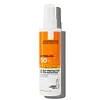What's inside
What's inside
 Key Ingredients
Key Ingredients

 Benefits
Benefits

 Concerns
Concerns

 Ingredients Side-by-side
Ingredients Side-by-side

Water
Skin ConditioningBis-Ethylhexyloxyphenol Methoxyphenyl Triazine
Skin ConditioningAlcohol Denat.
AntimicrobialEthylhexyl Triazone
UV AbsorberButyl Methoxydibenzoylmethane
UV AbsorberIsopropyl Palmitate
EmollientDiisopropyl Adipate
EmollientGlycerin
HumectantPropanediol
SolventIsopropyl Myristate
EmollientDiisopropyl Sebacate
EmollientC12-22 Alkyl Acrylate/Hydroxyethylacrylate Copolymer
StabilisingDicaprylyl Ether
EmollientTocopherol
AntioxidantPentylene Glycol
Skin ConditioningButyrospermum Parkii Butter
Skin ConditioningAcrylates/C10-30 Alkyl Acrylate Crosspolymer
Emulsion StabilisingCaprylyl Glycol
EmollientCitric Acid
BufferingDiethylamino Hydroxybenzoyl Hexyl Benzoate
UV FilterDrometrizole Trisiloxane
UV AbsorberHydroxyacetophenone
AntioxidantPhenylbenzimidazole Sulfonic Acid
UV AbsorberSodium Polyacrylate
AbsorbentTriethanolamine
BufferingTrisodium Ethylenediamine Disuccinate
Parfum
MaskingWater, Bis-Ethylhexyloxyphenol Methoxyphenyl Triazine, Alcohol Denat., Ethylhexyl Triazone, Butyl Methoxydibenzoylmethane, Isopropyl Palmitate, Diisopropyl Adipate, Glycerin, Propanediol, Isopropyl Myristate, Diisopropyl Sebacate, C12-22 Alkyl Acrylate/Hydroxyethylacrylate Copolymer, Dicaprylyl Ether, Tocopherol, Pentylene Glycol, Butyrospermum Parkii Butter, Acrylates/C10-30 Alkyl Acrylate Crosspolymer, Caprylyl Glycol, Citric Acid, Diethylamino Hydroxybenzoyl Hexyl Benzoate, Drometrizole Trisiloxane, Hydroxyacetophenone, Phenylbenzimidazole Sulfonic Acid, Sodium Polyacrylate, Triethanolamine, Trisodium Ethylenediamine Disuccinate, Parfum
Water
Skin ConditioningOctocrylene
UV AbsorberEthylhexyl Salicylate
UV AbsorberButyl Methoxydibenzoylmethane
UV AbsorberDiisopropyl Sebacate
EmollientGlycerin
HumectantEthylhexyl Methoxycinnamate
UV AbsorberC12-15 Alkyl Benzoate
AntimicrobialPolyglyceryl-6 Stearate
EmollientAcrylates Copolymer
Phenylbenzimidazole Sulfonic Acid
UV AbsorberTitanium Dioxide
Cosmetic ColorantTriethanolamine
BufferingTocopheryl Acetate
AntioxidantMicrocrystalline Cellulose
AbsorbentCaprylyl Glycol
EmollientPhenoxyethanol
PreservativeStearic Acid
Cleansing1,2-Hexanediol
Skin ConditioningPolyglyceryl-6 Behenate
Emulsion StabilisingChlorphenesin
AntimicrobialXanthan Gum
EmulsifyingAlumina
AbrasiveDisodium EDTA
Palmitic Acid
EmollientSilica
AbrasiveCellulose Gum
Emulsion StabilisingSodium Laureth Sulfate
CleansingWater, Octocrylene, Ethylhexyl Salicylate, Butyl Methoxydibenzoylmethane, Diisopropyl Sebacate, Glycerin, Ethylhexyl Methoxycinnamate, C12-15 Alkyl Benzoate, Polyglyceryl-6 Stearate, Acrylates Copolymer, Phenylbenzimidazole Sulfonic Acid, Titanium Dioxide, Triethanolamine, Tocopheryl Acetate, Microcrystalline Cellulose, Caprylyl Glycol, Phenoxyethanol, Stearic Acid, 1,2-Hexanediol, Polyglyceryl-6 Behenate, Chlorphenesin, Xanthan Gum, Alumina, Disodium EDTA, Palmitic Acid, Silica, Cellulose Gum, Sodium Laureth Sulfate
 Reviews
Reviews

Ingredients Explained
These ingredients are found in both products.
Ingredients higher up in an ingredient list are typically present in a larger amount.
Also known as Avobenzone, this ingredient is a chemical sunscreen filter that provides protection in the UV-A range.
Avobenzone is globally approved and is the most commonly used UV-A filter in the world.
Studies have found that avobenzone becomes ineffective when exposed to UV light (it is not photostable; meaning that it breaks down in sunlight). Because of this, formulations that include avobenzone will usually contain stabilizers such as octocrylene.
However, some modern formulations (looking at you, EU!) are able to stabilize avobenzone by coating the molecules.
Avobenzone does not protect against the UV-B range, so it's important to check that the sunscreen you're using contains other UV filters that do!
The highest concentration of avobenzone permitted is 3% in the US, and 5% in the EU.
Learn more about Butyl MethoxydibenzoylmethaneCaprylyl Glycol is a humectant and emollient, meaning it attracts and preserves moisture.
It is a common ingredient in many products, especially those designed to hydrate skin. The primary benefits are retaining moisture, skin softening, and promoting a healthy skin barrier.
Though Caprylyl Glycol is an alcohol derived from fatty acids, it is not the kind that can dry out skin.
This ingredient is also used as a preservative to extend the life of products. It has slight antimicrobial properties.
Learn more about Caprylyl GlycolWe don't have a description for Diisopropyl Sebacate yet.
Glycerin is already naturally found in your skin. It helps moisturize and protect your skin.
A study from 2016 found glycerin to be more effective as a humectant than AHAs and hyaluronic acid.
As a humectant, it helps the skin stay hydrated by pulling moisture to your skin. The low molecular weight of glycerin allows it to pull moisture into the deeper layers of your skin.
Hydrated skin improves your skin barrier; Your skin barrier helps protect against irritants and bacteria.
Glycerin has also been found to have antimicrobial and antiviral properties. Due to these properties, glycerin is often used in wound and burn treatments.
In cosmetics, glycerin is usually derived from plants such as soybean or palm. However, it can also be sourced from animals, such as tallow or animal fat.
This ingredient is organic, colorless, odorless, and non-toxic.
Glycerin is the name for this ingredient in American English. British English uses Glycerol/Glycerine.
Learn more about GlycerinThis ingredient is more commonly known as Ensulizole, a chemical sunscreen ingredient.
Ensulizole mainly protects UV-B (290-340 nm) but offers a little UV-A (320-400 nm) protection. It is often paired with less photo-stable sunscreen ingredients due to its photo-stability.
Due to it being water-soluble, Ensulizole helps give sunscreens a light and non-oily texture.
Ensulizole is approved worldwide:
Learn more about Phenylbenzimidazole Sulfonic AcidTriethanolamine is an emulsifier and pH adjuster. It is created using ethylene oxide and ammonia. This gives Triethanolamine a nitrogen core and a similar scent to ammonia.
As an emulsifier, it prevents ingredients from separating and enhances texture by adding volume to a product.
PH adjusters are common in cosmetic products. The pH of a product can affect the effectiveness of other ingredients. A product with a high pH may also irritate the skin.
Learn more about TriethanolamineWater. It's the most common cosmetic ingredient of all. You'll usually see it at the top of ingredient lists, meaning that it makes up the largest part of the product.
So why is it so popular? Water most often acts as a solvent - this means that it helps dissolve other ingredients into the formulation.
You'll also recognize water as that liquid we all need to stay alive. If you see this, drink a glass of water. Stay hydrated!
Learn more about Water